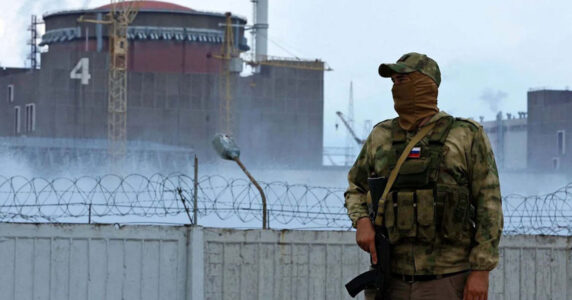Navigation and useful materials
The share of Ukrainians for whom the main source of news is social networks is growing every year. According to the results of the Internews study, which was conducted in November, 74% of our fellow citizens used social networks as a source of news, and78% among internally displaced persons.
Telegram dominates this group. News content in this messenger was consumed by 60% of Ukrainians. Telegram’s leadership was also confirmed by the July poll of the Kyiv International Institute of Sociology. Users prefer Telegram channels due to the ease of use and promptness.
Therefore, the attention of Russian propagandists to this platform is predictable. The network of channels they created, mimicking Ukrainian ones, is used to promote narratives beneficial to the Kremlin. Back in 2021, the SSU officially informed the public that the Telegram channels “Legitimny,” “Resident,” “Spletnitsa,” and related resources work for the special services of Russia to destabilize the socio-political situation in Ukraine. Despite this, the Ukrainian audience of these resources remains huge.
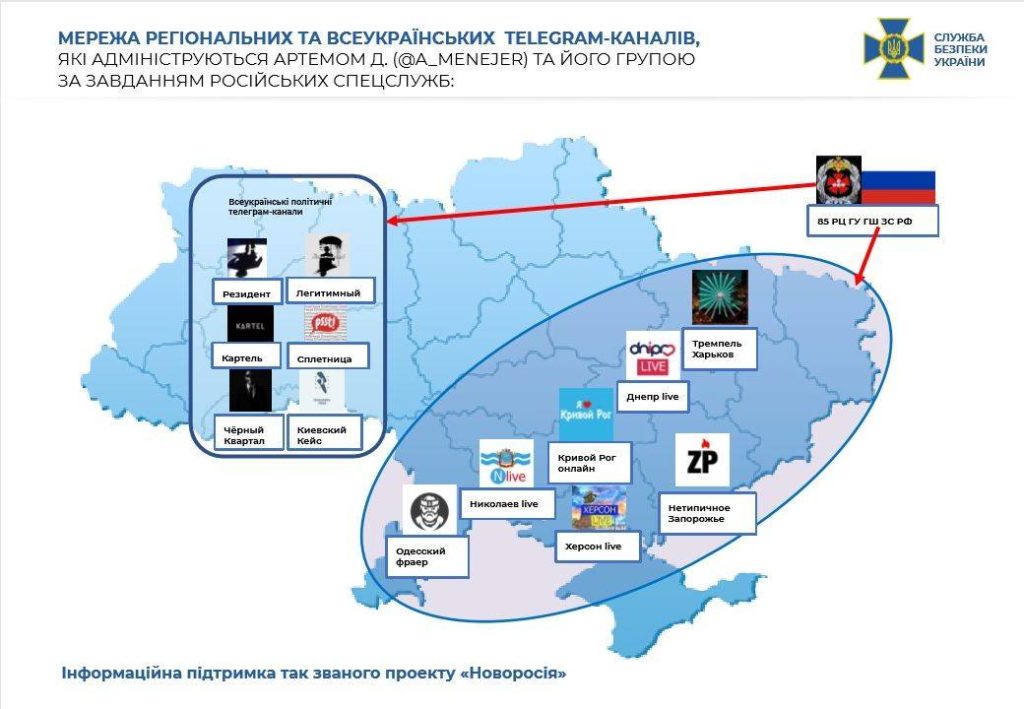
The network’s key channels were launched during and shortly after the 2019 presidential campaign. After the full-scale invasion, the network was significantly expanded. A Detector Media study mentions 88 channels that were created between February 24 and early March 2022. Some of them blatantly do not conceal their propaganda essence or are “official” channels of the occupation administrations. However, a significant number of them mimic local “news” channels, diluting reports of air raid sirens and other events with promotion of Kremlin narratives.
The Centre for Strategic Communication and Information Security analysed what pseudo-Ukrainian Telegram channels wrote about Western support in December last year.
What do Telegram channels write about Western support for Ukraine?
Given the importance of military, economic, and diplomatic support from NATO and the EU for Ukraine, Russian propaganda efforts are aimed at discrediting this support, as well as demoralizing Ukrainians. To this end, the following messages are promoted:
- the West is “tired” of Ukraine (Ukrainians have been convinced of this since 2014);
- the level of support for Ukraine among the political elites and societies of the United States and the EU countries is steadily declining, so, soon, it will be significantly reduced or even stopped;
- the West does not trust Ukraine and suspects it of embezzling the aid;
- The West supports Ukraine only because it is interested in weakening Russia;
- The West is not interested in the victory of Ukraine, so, it limits the amount of aid;
- the more the West supports Ukraine, the longer the war will last, and the more victims there will be;
- after losing Western support, Ukraine will be forced to make concessions to Russia;
- The West will put pressure on Ukraine and push it to make concessions to the Kremlin.
The tasks of these messages are:
- to discredit Ukraine’s Western partners, who are portrayed as cynical and unprincipled “imperialist predators”;
- to undermine the trust in the Ukrainian military-political leadership, which is allegedly distrusted by its partners and suspected of abuses;
- to discredit the Ukrainian army, whose combat capability allegedly rests only on Western weapons.
The key goal of the propagandists is to demoralize Ukrainians, to instill the confidence in the “invincibility” of Russia and the need for a truce at any cost.
Selective Citation, Anonymous “Analytics,” and Fictional “Insights”: How Kremlin Messages Are Promoted
Pseudo-Ukrainian Telegram channels avoid direct propaganda, carefully hiding it behind the citation of sources: from reliable ones to really marginal, with fictional “insights” and anonymous “analytics” of dubious quality.
Like traditional Russian media, Telegram channels actively quote statements by Western “friends of the Kremlin”: politicians and political commentators. Their voices, to which more attention is paid in Russia than at home, aim to create the illusion of strong support for the Kremlin’s actions in the US and the EU.
One of these commentators is former member of the European Parliament Florian Philippot. He “exposes” “Ukrainian Nazis,” criticizes the EU for supporting Ukraine, accuses Kyiv and the Zelenskyy couple personally of excessive appetite for European funds.

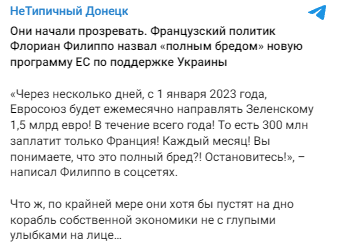
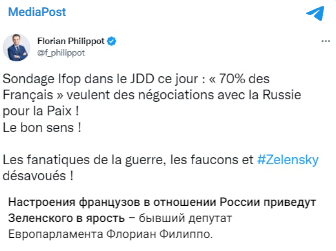
Philippot’s Twitter account is a steady source of information for Russian propagandists. During December alone, his posts on Telegram channels were quoted as many as 590 times. Among them, 10 of them positioned themselves as Ukrainian channels. By comparison, French and other European media had no mention of the politician in December.
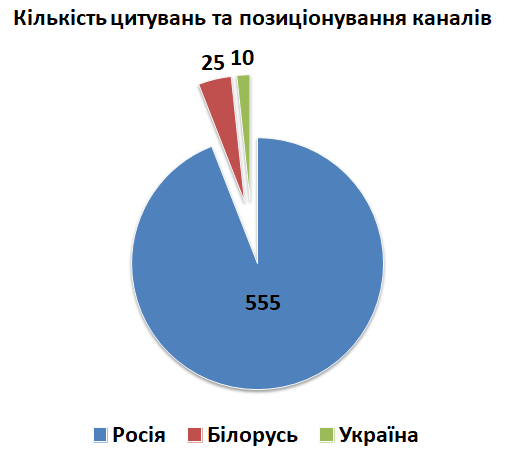
The December tweet of the American radio host Garland Nixon about “snow in Zelenskyy’s office” (a combination of stories about the embezzlement of American aid and drug addiction of the Ukrainian president) was quoted by 102 Telegram channels, 6 of which mimic Ukrainian ones.

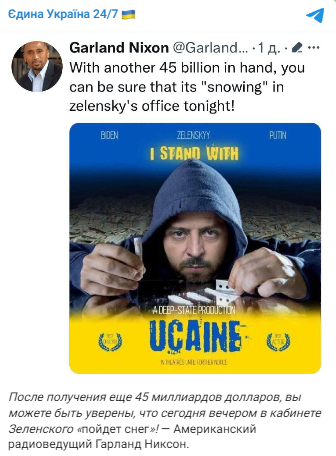
Similar is the situation to the regular statements of Scott Ritter, a former UN inspector convicted in 2011 of molesting a minor. Russian media position him as a former intelligence officer and military expert. In December, Russian-language Telegram channels quoted his posts more than a thousand times. 30 of these publications were posted on pseudo-Ukrainian channels.
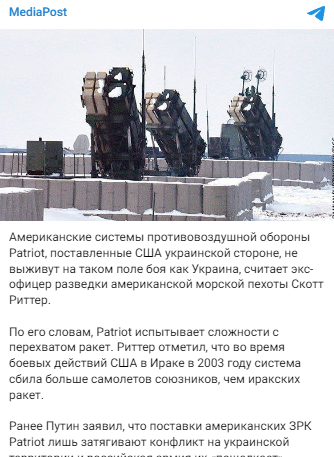
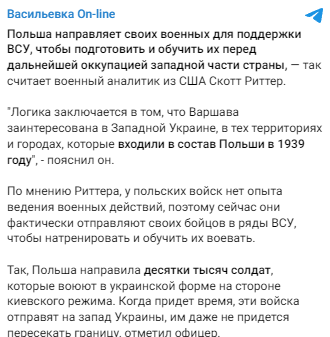
In addition to the obvious “friends” of the Kremlin, Telegram channels actively refer to analytical articles and sociological studies published in Western publications. However, they quote the latter selectively, accompanied by their own comments and conclusions, which in fact contradict their original meaning.
Thus, in December, three studies came to the attention of propagandists.
Telegram channel administrators paid the most attention to the material of the think tank The Chicago Council on Global Affairs. At the end of November, sociologists recorded an increase in the level of disagreement among American citizens regarding the duration and increase in the quality of assistance and support for Ukraine by the United States (primarily among supporters of the Republicans). Almost identical publications about the “rapid decline” in the Americans’ level of support for Ukraine at the end of December were posted by “Resident,” “Nabliudatel,” “MediaKiller,” “Odessa Fraer,” “First War News,” and other Telegram channels. Some of them even did it twice.
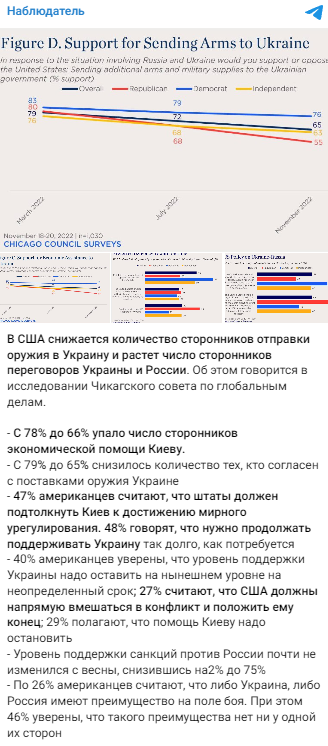
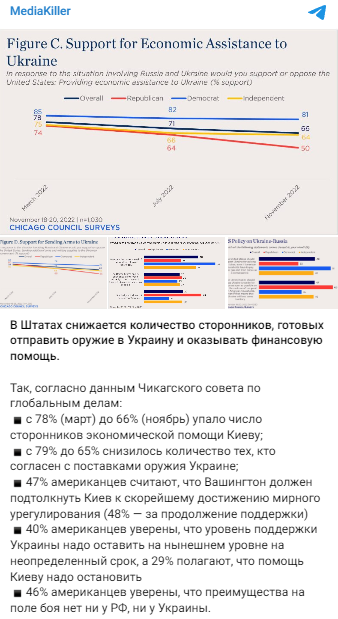
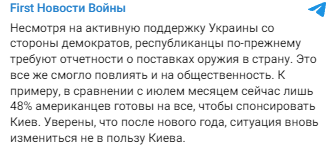
Another propaganda trend is selective citation and emphasis on indicators that are openly manipulated. The posts openly distort information about the strengthening of US sanctions pressure on the Russian Federation—it has decreased allegedly by 2% (with a possible margin of error of 3% stated by the authors of the study).
Russian propagandists simply ignore the conclusions drawn by the authors of the study. In fact, sociologists record a stable majority in American society of those who support the current level of military and economic aid to Ukraine. At the same time, the respondents really differ in their views on the necessity of its significant increase. The authors note the significant influence of the media when it comes to shaping public opinion regarding support for Ukraine.
The study, which was commissioned by the European Parliament, recorded a high level of approval of support for Ukraine by EU citizens. The survey found that 74% of Europeans support aid to Ukraine (33% approve of it fully, and 41%‒ partly).

Some Telegram channels submitted this news without commenting at all, others ‒ resorted to “analytics.” Propagandists interpret the high level of support for Ukraine in the EU as a “signal” about the “endless” duration of the war. In addition, these publications were mostly addressed to traditionally “Russophile” countries.
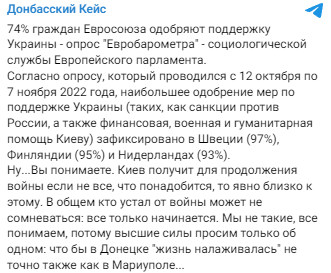
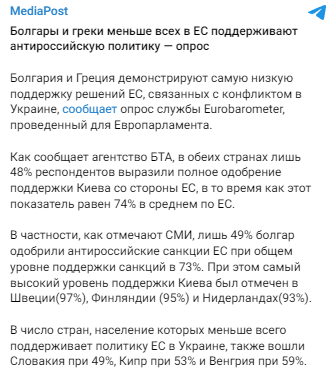
The same technique was used when quoting the results of the MIDEM (Mercator Forum for Migration and Democracy) survey regarding the study of the attitude of EU citizens to migration. This time, Telegram channels put in the foreground not even individual countries with the most prejudiced attitude of the population towards Ukrainians, but their regions. In particular, East Germany (former GDR).
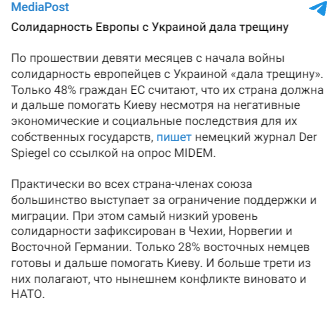
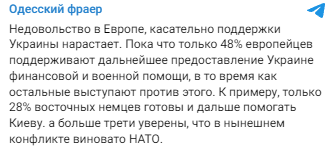
Based on manipulative quoting of sociological studies, Telegram channels resort to no less manipulative conclusions and forecasts, predicting the end of support for Ukraine and its citizens by Western countries in the near future.

A similar approach is applied not only to poll results, but also to analytical materials and journalism in Western publications. Administrators of Telegram channels pay attention only to those texts, or their parts, that indicate the problems that await Ukraine. Materials with an analysis of the negative consequences for Russia as a result of the war it unleashed are completely disregarded. Similarly, ignored is the difference between an op-ed and an editorial.

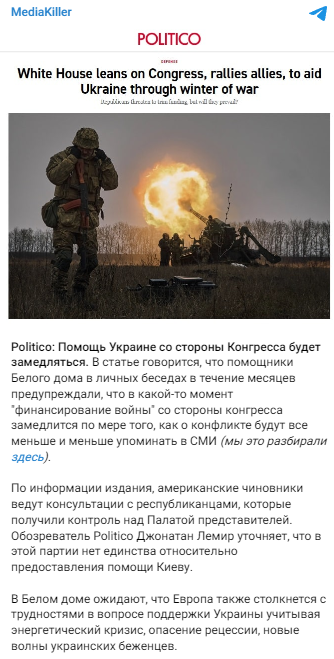
Anonymous Telegram channels do not shy away from much more primitive manipulations and outright fakes.
There are regular attempts to redirect the discontent of Ukrainians due to blackouts, from the Russians, who are shelling critical infrastructure, to… citizens of Western countries. They allegedly don’t help at all and just enjoy their lives while Ukraine is suffering from the war. For this purpose, solidarity campaigns are neglected in Telegram channels. The manipulations are aimed at giving readers the impression that turning off of the lights in a show of solidarity ‒ is the only support that Ukrainians can count on. Such publications fail to mention hosting of refugees, military or economic aid.

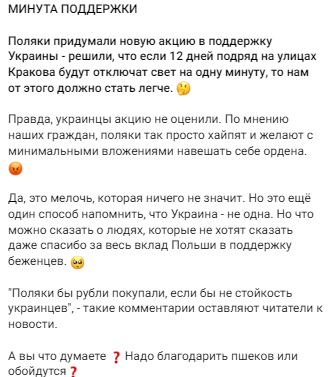

They are also trying to convince Ukrainians that citizens of European countries are growing increasingly unhappy with the prospect of impoverishment which they had never faced before they started supporting Ukraine.
Evidence of this was supposed to be a video from Milan near the humanitarian aid delivery point and during the “anti-war” rally in Nuremberg. The purpose of these publications is to form a “picture” and create the impression that all of Italy is standing in lines for products, and all of Germany ‒ is protesting against anti-Russian sanctions, rising tariffs and military support for Ukraine. The author of this publication, of course, ignored the fact that supporters of far-left views do not represent the views of all German citizens.
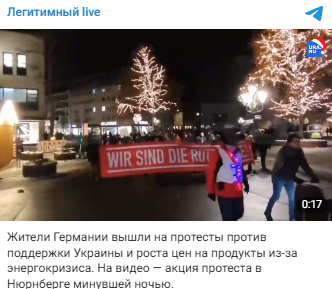
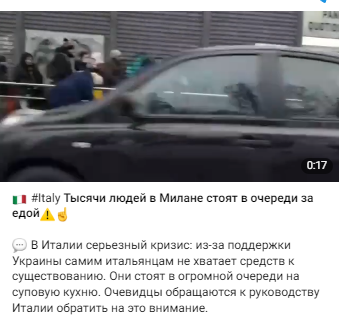
Product delivery points have been operating in Milan and other Italian cities for many years. One of the country’s oldest charitable organizations, Pane Quotidiano (its name translates as “daily bread”) has long been providing food kits to representatives of socially vulnerable groups, mainly migrants. Photos and videos taken near the points of the organization are regularly used by Russian and Belarusian propaganda to illustrate the “crisis in the EU.” RT made a story about Milan back in the “covid” year of 2020.
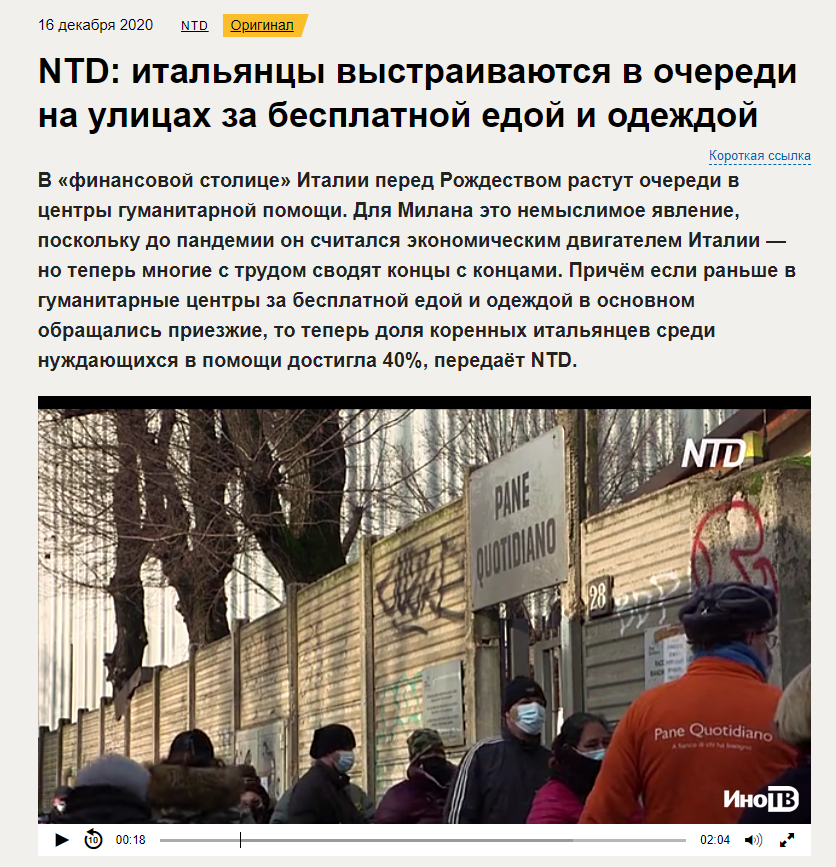
Anonymous “analytics” and fictitious “insights” are a separate genre of publications in anonymous Telegram channels. The rapid growth of the audience of “Legitimny”, “Resident” and related resources in 2019-2020 was based on the creation of the illusion of confidentiality and access to exclusive sources of information. Currently, the circle of “sources” has expanded. And they are pretending to have secret sources not only in the Office of the President of Ukraine, but also on the Capitol Hill.
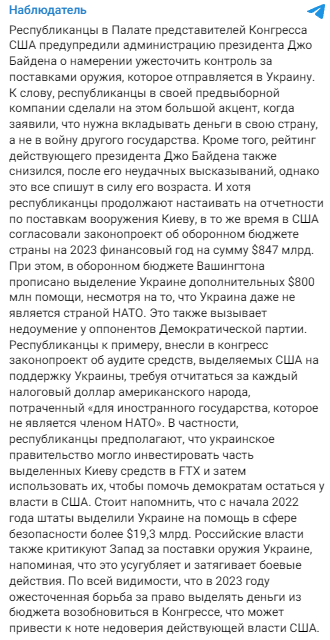
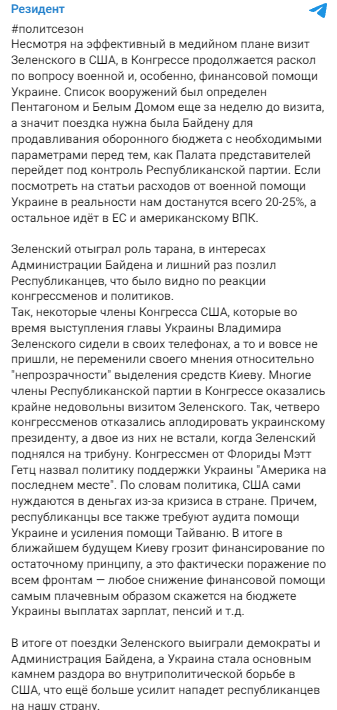
For years, Russian propaganda has been trying to convince its audience that the West is “tired” and is about to start “turning its back” on Ukraine. All Kremlin media resources are working to promote these messages, including a network of anonymous Telegram channels, some of which mimic Ukrainian ones. However, their Russian nature is revealed by participation in joint information campaigns and simultaneous distribution of almost identical messages.
The administrators of these resources obviously count on the conspiratorial mindset and the low level of media literacy of their audience, who will not check the retellings of their publications with the originals, but will rather blindly trust rumours and fabrications. Their dissemination is aimed at disorienting and demoralizing Ukrainians in wartime conditions.
Centre for Strategic Communication and Information Security
If you have found a spelling error, please, notify us by selecting that text and pressing Ctrl+Enter.
